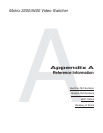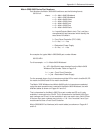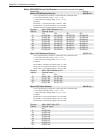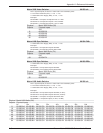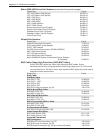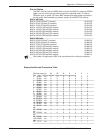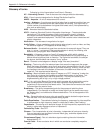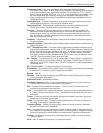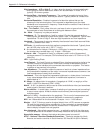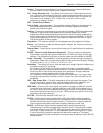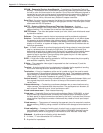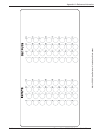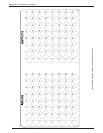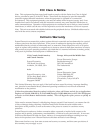
Appendix A • Reference Information
Extron • Matrix 3200/6400 Series • User’s ManualA-9
Output – The product of an operation by a device going to some external destination,
such as another device, a video screen, image or hard copy.
PAL – Phase Alternate Line – The phase of the color carrier is alternated from line to
line. It takes four full pictures for the color horizontal phase relationship to return to
the reference point. This alternation helps cancel out phase errors, the reason the
hue control is not needed on PAL TV sets. PAL, in its many forms is used
extensively in Western Europe.
PCB – Printed Circuit Board
Peak-to-Peak – abbreviated p-p – The amplitude (voltage) difference (as displayed on
an oscilloscope) between the most positive and the most negative excursions
(peaks) of an electrical signal.
Peaking – A means of compensating for mid and high frequency RGB Video Bandwidth
response in data monitors and projectors and for signal losses due to cable
capacitance. When using the Peak enhancements, use the following guidelines for
proper output settings: Use 50% with all computer frequencies between 15-125 kHz
at any cable length. Use 100% with high frequency computers of 36 kHz or higher
with cable lengths 75 feet or greater.
Pincushion – The inward or outward (curved) appearance of the edges of a display.
Pin-out – An illustration or table that names signals, voltages, etc. that are on each pin
of a connector or cable.
Plenum Cable – Cable having a covering that meets the UL specifications for resistance
to fire.
PLUGE – Picture Line Up Generation Equipment – This is a name of a test pattern
that assists in properly setting picture black level. PLUGE can be part of many test
patterns. The phrase and origination of the test signal are both credited to the BBC.
Power – Electrical – The dissipation of heat by passing a current through a resistance.
Measured in Watts (W), it is expressed by Ohm’s law from the two variables: Voltage
(E) and Current (I). i.e. P = I
2
xR, or, P = E
2
/R or P = ExI
Resolution – The density of lines or dots that make up an image. Resolution determines
the detail and quality in the image.
A) A measure of the ability of a camera or television system to reproduce detail.
B) In video, generally called horizontal resolution. It can be evaluated by establishing
the limit to which lines can be distinguished on a test pattern. A larger resolution
value means a broader frequency band of the video signal.
C) A measure of the greatest amount of detail that can be seen in an image. Often
incorrectly expressed as a number of pixels in a given line; more correctly it is the
bandwidth.
RGB – Red, Green, Blue – The basic components of the color television system. They
are also the primary colors of light, not to be confused with Cyan, Magenta, and
Yellow, the primary pigments. Also called the “Additive Color Process”.
RGB Video – A form of color video signal (red, green, blue) distinctly different from the
composite color video used in standard television sets. RGB can be displayed only
on a color monitor that has a separate electron gun for each of these primary colors.
Some color television sets use only one gun. RGB monitors are noted for their crisp,
bright colors and high resolution.
RS-170A – EIA technical standard NTSC color TV.
RS-232 – An Electronic Industries Association (EIA) serial digital interface standard
specifying the electrical and mechanical characteristics of the communication path
between two devices using D-type connectors. This standard is used for relatively
short range communications and does not specify balanced control lines.
RS-422 – An EIA serial digital interface standard which specifies the electrical
characteristics of balanced voltage digital interface circuits. This standard is usable
over longer distances than RS-232. Although originally designed for use with 9-pin
and 37-pin, D-type connectors, it is often used with others, including 25-pin D-types.
It is also used as the serial port standard for Macintosh computers. This signal
governs the asynchronous transmission of computer data at speeds of up to 920,000
bits per second.



